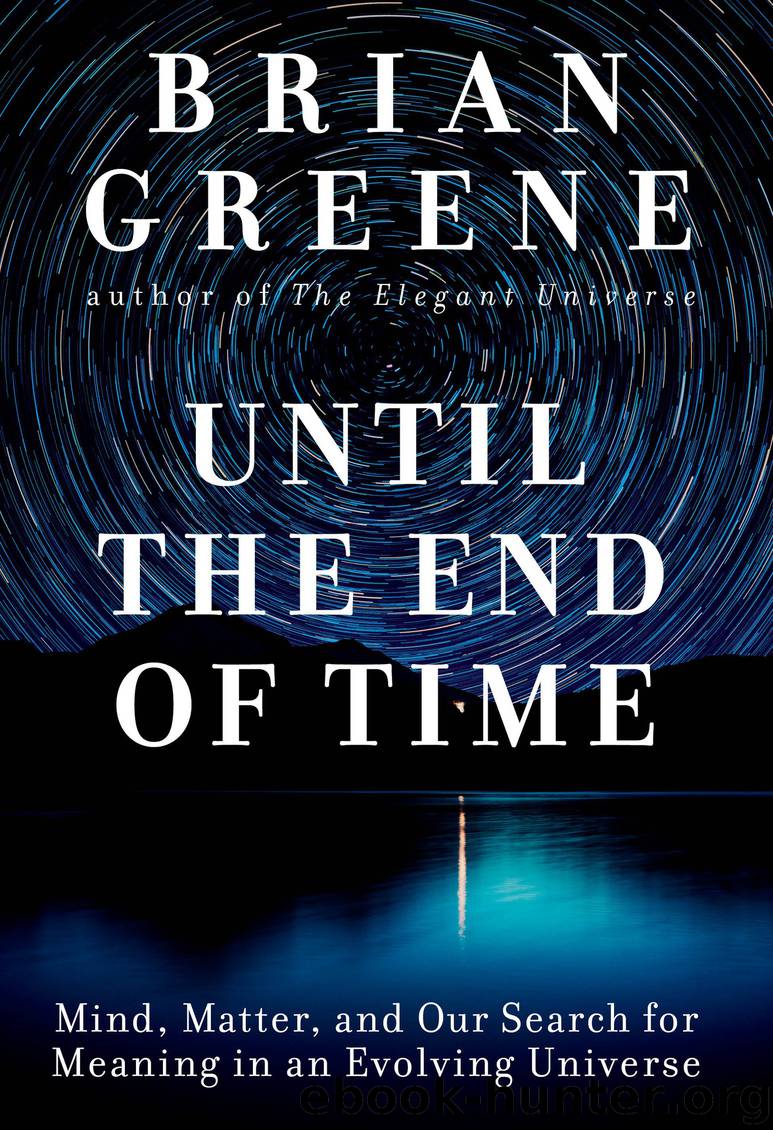Until the End of Time by Brian Greene

Author:Brian Greene
Language: eng
Format: epub, mobi
Publisher: Knopf Doubleday Publishing Group
Published: 2020-02-17T16:00:00+00:00
Belief, Confidence, and Value
Almost to a person, those who inquire about my belief in God invoke “belief” in the very same way they would if asking about my belief in quantum mechanics. In fact, I’m often asked the two questions in tandem. I tend to phrase my response in terms of confidence—a measure of certainty—noting that my confidence in quantum mechanics is high, because the theory accurately predicts features of the world, such as the electron’s magnetic dipole moment, with a precision beyond the ninth decimal place, while my confidence in the existence of God is low because of the paucity of rigorous supporting data. Confidence, as these examples illustrate, emerges from dispassionate, essentially algorithmic judgment of evidence.
Indeed, when physicists analyze data and announce a result, they quantify their confidence using well-established mathematical procedures. The word “discovery” is generally used only when the confidence crosses a mathematical threshold: the probability of being misled by a statistical fluke in the data must be less than about one in 3.5 million (an arbitrary-looking number but one that naturally emerges in statistical analyses). Of course, even such high levels of confidence do not ensure that a “discovery” is true. Data from subsequent experiments may require us to adjust our confidence; in this case, too, mathematics provides an algorithm for calculating the update.
While few of us live by such mathematical methods, we arrive at many of our beliefs through similar if less overtly analytical reasoning. We see Jack with Jill, and wonder if they might be a couple; we see them together again and again, and our confidence in that conclusion grows. Later, we learn that Jack and Jill are siblings, and so we discount our previous assessment. And on it goes. It is an iterative process that you might anticipate converging on beliefs that reflect the true nature of the world. But that need not be the case. Evolution did not configure our brain processes to form beliefs that align with reality. It configured them to favor beliefs that generate survival-promoting behaviors. And the two considerations need not coincide. If our forebears had carefully investigated every swish and rustle that caught their attention, they would have found that most could be explained without invoking a volitional agent. But from the standpoint of adaptive fitness, their burdensome investment in seeking the truth would have had little going for it. Across tens of thousands of generations, our brains eschewed greater accuracy for a rough-and-ready understanding. Nimble responses often beat considered assessments. Verity is an important character in the drama of belief but is easily upstaged by survival and reproduction.
Thickening the plot further, evolution added another cast member: emotions. In 1872, more than a dozen years after announcing evolution by natural selection, Darwin published The Expression of the Emotions in Man and Animals, exploring his conviction that the biologically adapted brain, not culture, is the primary driver of emotional expression. Drawing on close observations of his children, widely disseminated questionnaires, and cross-cultural data he
Download
This site does not store any files on its server. We only index and link to content provided by other sites. Please contact the content providers to delete copyright contents if any and email us, we'll remove relevant links or contents immediately.
| Aeronautics & Astronautics | Astronomy |
| Astrophysics & Space Science | Comets, Meteors & Asteroids |
| Cosmology | Mars |
| Solar System | Star-Gazing |
| Telescopes | UFOs |
Tools of Titans by Timothy Ferriss(8356)
Turbulence by E. J. Noyes(8013)
Secrets of Antigravity Propulsion: Tesla, UFOs, and Classified Aerospace Technology by Ph.D. Paul A. Laviolette(5361)
Astrophysics for People in a Hurry by Neil DeGrasse Tyson(5172)
Room 212 by Kate Stewart(5095)
Design of Trajectory Optimization Approach for Space Maneuver Vehicle Skip Entry Problems by Runqi Chai & Al Savvaris & Antonios Tsourdos & Senchun Chai(5058)
Pale Blue Dot by Carl Sagan(4988)
The David Icke Guide to the Global Conspiracy (and how to end it) by David Icke(4691)
A Journey Through Divination and Astronomy by Publishing Pottermore(4372)
Goodbye Paradise(3794)
Apollo 8 by Jeffrey Kluger(3698)
COSMOS by Carl Sagan(3612)
The Five People You Meet in Heaven by Mitch Albom(3548)
Losing the Nobel Prize by Brian Keating(3531)
How to Read Water: Clues and Patterns from Puddles to the Sea (Natural Navigation) by Tristan Gooley(3453)
Brief Answers to the Big Questions by Stephen Hawking(3415)
How to Read Nature by Tristan Gooley(3322)
The Order of Time by Carlo Rovelli(3177)
A Brief History of Time by Stephen Hawking(3013)
